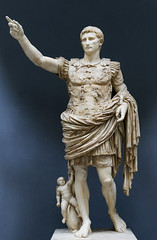Chapter 3- Eurasian Empires
| 11135109909 | Alexander the Great | Alexander III of Macedonia, conqueror of the Persian Empire and part of northwestern India. |  | 0 |
| 11135109910 | Ashoka | The most famous ruler of the Mauryan empire; he converted to Buddhism and tried to rule peacefully and with tolerance. |  | 1 |
| 11135109911 | Athenian Democracy | A radical form of direct democracy in which much of the free male population of Athens had the franchise and officeholders were chosen by lot. |  | 2 |
| 11135109912 | Caesar Augustus | The great-nephew and adopted son of Julius Caesar who emerged as sole ruler of the Roman state at the end of an extended period of civil war. |  | 3 |
| 11135109913 | Greco Persian War | Two major Persian invasions of Greece, in which the Persians were defeated on both land and sea each time. |  | 4 |
| 11135109914 | Han Dynasty | Dynasty that ruled China, creating a durable state based on Shihuangdi's state-building acheivement. |  | 5 |
| 11135109915 | Hellenistic Era | The period in which Greek culture spread widely into Eurasia in the kingdoms ruled by Alexander's political successors. |  | 6 |
| 11135109916 | Mauryan Empire | A major empire founded by Chandragupta that encompassed most of India and unified the Indian subcontinent. |  | 7 |
| 11135109917 | pax Romana | The "Roman Peace," a term typically used to denote the stability and prosperity of the early Roman Empire. |  | 8 |
| 11135109918 | Persian Empire | A major empire that expanded from the Iranian plateau to incorporate the Middle East from Egypt to India. |  | 9 |
| 11135109919 | Qin Shihuangdi | First emperor from the Qin that forcibly reunited China and established a strong and repressive state. |  | 10 |
| 11135109920 | Trung Trac | The older of two sisters that lead the Vietnamese Revolution. She lived from 12 - 43 C.E and rather than being captured in war after her troops were badly defeated, legend says she committed suicide in honor of her family. |  | 11 |
| 11135109921 | Kushan Empire | An empire located in Northern India and Central Asia. They maintained the Silk Road and they were one of the first emerging territories from Bactria. |  | 12 |
| 11135109922 | Empire | States, political systems that exercise coercive power; often multi-national, aggressive, and often conquer, rule and extract resources from other states. |  | 13 |
| 11135109923 | Imperial State | A state that imposes its will on other states politically, economically and socially. |  | 14 |
| 11135109924 | Cyrus, Darius, Xerxes | Rulers of the Persian Empire |  | 15 |
| 11135109925 | Solon, Cleisthenes, and Pericles | The fathers of democracy, statesmen, and politicians | 16 | |
| 11135109926 | Civil Service Exam | Test to see if you are able to work for the government | 17 | |
| 11135109927 | Liu Bang | Founder and first emperor of Han Dynasty | 18 | |
| 11135109928 | Han Wudi | 7th emperor of Han Dynasty, Longest reigning emperor (54 years) | 19 | |
| 11135109929 | Wang Mang | Emperor of Han Dynasty who seized the rule from the Liu family, and then founded the Xin Dynasty | 20 | |
| 11135109930 | Julius Caesar | Roman politician and general who eventually led to the demise of the Roman Republic and gave rise to the Roman Empire | 21 |

